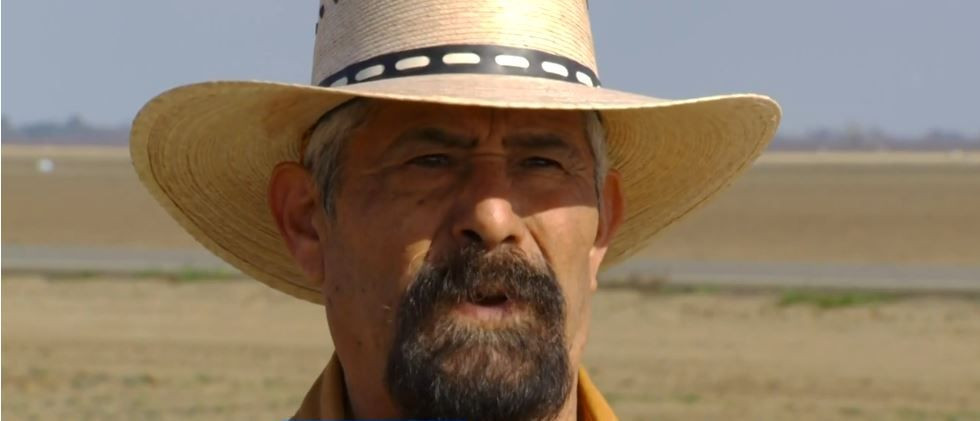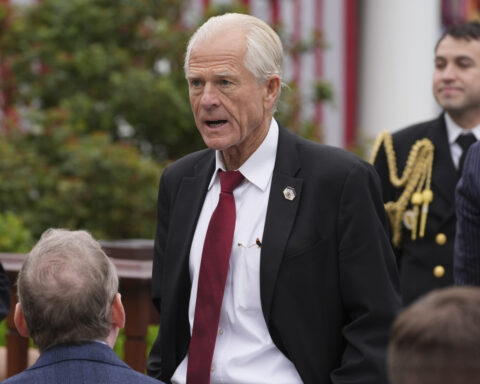DIXON, California (KOVR) -- California has more undocumented immigrants than any other state in the country, and there is plenty of work done to bring them here, even if the law does not allow it.
Dixon is one of the rural California communities dealing with this season of political change as President Trump's administration has called for mass deportations of undocumented immigrants.
Farmworker Gerardo Reyes, 71, showed us where tomato plants will soon be growing on land in Dixon.
With the federal immigration sweep underway, Reyes, who became a naturalized U.S. citizen through Ronald Reagan's amnesty, is worried for his fellow farmworkers who are not citizens.
"The change is that he has already started to do what he predicted," Reyes said.
Of the 900,000 farmworkers in California, half are undocumented.
Antonio de Loera works for the United Farmworkers. He said that undocumented farmworkers are accepted for employment if they can present a social security number for IRS form I-9s used for employment eligibility verification.
They can bypass this hiring process by providing fake social security numbers that can be bought on the black market.
"I think this is just a situation where the economic reality is more powerful than whatever the law happens to be," de Loera said. "That's another one of these open secrets, where your employer will generally ask you for a social security number, but there is no way of checking whether that social security number is real."
"Or they don't want to check," de Loera said.
Reyes says the counterfeit social security numbers sell for about $150 apiece.
"For example, I know of a person who has contacts with those people who falsify documents, and through that connection, he communicates with them when he needs two or three social security numbers," Reyes said. "The process is carried out immediately and it's done easily."
The U.S. government has created a way to verify IDs called E-verify. The federal program E-Verify can be voluntarily used in this state, but California passed a law 15 years ago that says the government cannot force private businesses to use it. The state legislature cited concerns over costs and accuracy when they passed it.
"Shouldn't E-Verify solve this problem?" I asked University of California, Davis Professor Daniel Sumner.
Sumner is an expert on the economics of agricultural sustainability.
"In a sense, the problem with E-Verify is that it solves one problem but it doesn't solve any of the others," Sumner responded. "It doesn't help low-income people make a better living. It doesn't help farmers find more willing workers."
Ira Mehlman is a spokesperson for the Federation for American Immigration Reform, or FAIR. The organization supports President Trump's deportation plan.
"The solution is to make it clear to people that you don't violate our laws and expect that you're going to be able to benefit from it," Mehlman said.
I then asked Mehlman, "If I'm hearing you correctly, there are no concessions. There is no compromise. Every single person that's undocumented in this country, you think, should not be here anymore?"
"It doesn't mean we're going to deport everybody," Mehlman responded. "There's no law made by man or God that has 100% compliance. I assure this will not be an exception, but we don't have to capitulate to people coming into the country saying, 'I'm here and you can't send me home.' "
n 2023, Congress killed an immigration reform bill that would have:
required e-verify for businesses.
allowed undocumented individuals to earn a path to legal status.
expanded the H-2A worker visa program to year-round agriculture sectors.
funded more border security.
In Dixon, Reyes was preparing for this year's harvest with a sense of uncertainty and no immigration reform insight.
"They are afraid to go to work and for that reason, we want to encourage them," Reyes said.
In this fractured landscape, the search continues for common ground.

 Trump has begun another trade war. Here's a timeline of how we got here
Trump has begun another trade war. Here's a timeline of how we got here
 Canada's leader laments lost friendship with US in town that sheltered stranded Americans after 9/11
Canada's leader laments lost friendship with US in town that sheltered stranded Americans after 9/11
 Chinese EV giant BYD's fourth-quarter profit leaps 73%
Chinese EV giant BYD's fourth-quarter profit leaps 73%
 You're an American in another land? Prepare to talk about the why and how of Trump 2.0
You're an American in another land? Prepare to talk about the why and how of Trump 2.0
 Chalk talk: Star power, top teams and No. 5 seeds headline the women's March Madness Sweet 16
Chalk talk: Star power, top teams and No. 5 seeds headline the women's March Madness Sweet 16
 Purdue returns to Sweet 16 with 76-62 win over McNeese in March Madness
Purdue returns to Sweet 16 with 76-62 win over McNeese in March Madness






